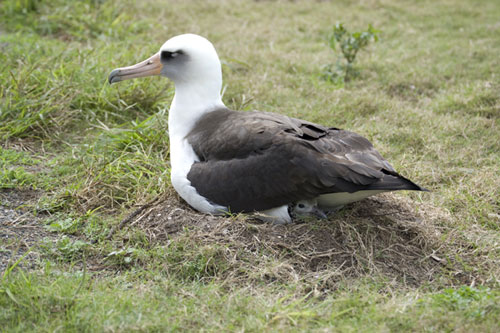Studies conducted on USA's Sand Island, part of Midway Atoll in the North West Hawaiian Islands, have shown that Laysan Albatross Phoebastria immutabilis chicks exhibit symptoms of lead toxicity leading to mortality, thought due to ingestion of lead-based paint chips and soil contaminated with paint chips. Up to 7% of the chicks on the island fail to fledge as a result of lead poisoning each year, estimated in one recent study to result in a 16% reduction in population size ( some 190 000 less birds) 50 years in the future unless action is taken (click here http://www.acap.aq/2009-news-archive/lead-poisoning-threatens-the-laysan-albatrosses-of-midway).
The primary sources of the paint chips that contaminate the soil where the albatrosses breed are the various buildings and structures on Sand Island, some of which date back to the early 1900s. From 2005 to February 2010 the US Fish and Wildlife Service (FWS) treated 24 of the 95 buildings on the island that are contaminated with lead-based paints.
The FWS has now authorized initiation of an expanded Engineering Evaluation/Cost Analysis to delineate further the nature and extent of the release of lead contamination at Midway, to develop and evaluate removal action alternatives, and to implement an appropriate alternative by July 2011. The US Department of the Interior's Central Hazardous Materials Fund is providing US $1.4 million to examine the extent of contamination and to develop removal alternatives and associated cleanups.
Click here http://www.fws.gov/midway/lpa.html for more details of this initiative to help conserve the Laysan Albatross.
Midway Atoll is part of the Papahānaumokuākea Marine National Monument, now a listed site under the World Heritage Convention.

The ACAP Species Assessment for the Laysan Albatross can be accessed from http://www.acap.aq/acap-species.
John Cooper, ACAP Information Officer, 10 October 2010

 English
English  Français
Français  Español
Español